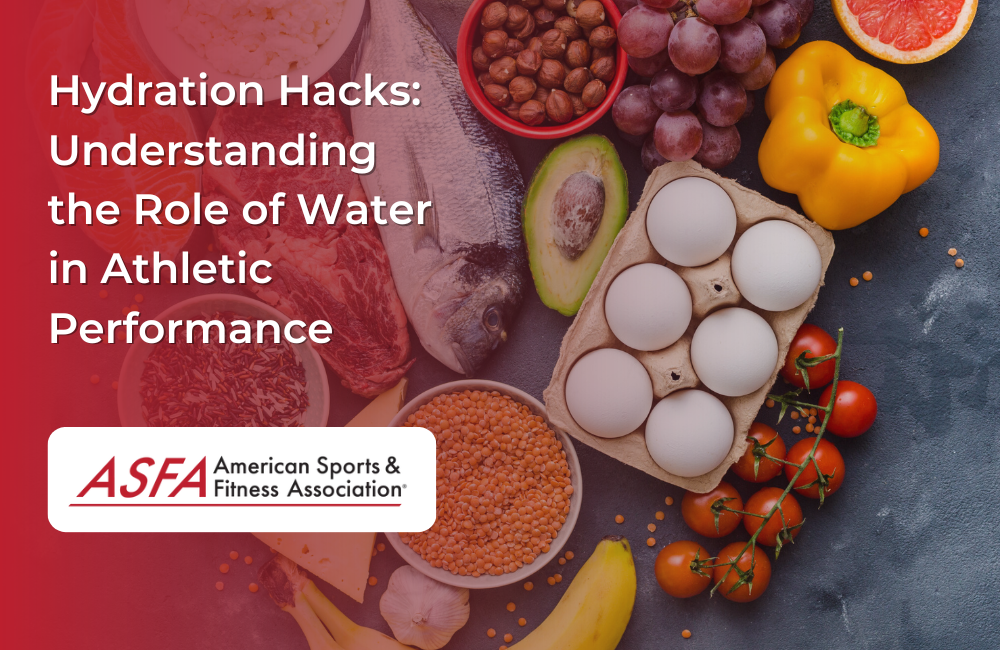Water is the elixir of life, and its significance in the realm of sports and athletic performance cannot be overstated. Proper hydration is a fundamental element of athletic success, impacting everything from endurance to muscle function. In this blog, we will delve into the critical role of water in athletic performance, explore the signs of dehydration, and provide essential hydration hacks to keep you at the top of your game.
The Importance of Hydration in Sports
Hydration is a cornerstone of athletic performance for several reasons:
1. Temperature Regulation:
During exercise, your body generates heat. Sweating is the primary mechanism for cooling down, and water plays a vital role in this process. Staying hydrated helps regulate body temperature, preventing overheating (heat exhaustion) and more severe conditions like heatstroke.
2. Muscle Function:
Muscles require water to function optimally. Dehydration can lead to muscle cramps, weakness, and reduced power output. Proper hydration ensures your muscles can contract efficiently.
3. Cardiovascular Performance:
Blood is primarily composed of water. When you're dehydrated, blood volume decreases, which can lead to reduced cardiac output and increased heart rate. Adequate hydration helps maintain cardiovascular performance.
4. Energy Production:
Water is essential for the metabolism of carbohydrates and fats, which provide energy during exercise. Dehydration can impair your ability to convert food into energy, leading to fatigue.
5. Mental Focus:
Dehydration can impact cognitive function, including focus, decision-making, and reaction time. In sports that require precision and strategy, staying hydrated is essential.
Signs of Dehydration
Recognizing the signs of dehydration is crucial for athletes to intervene before performance is compromised. Common signs of dehydration include:
- Thirst: Feeling thirsty is an early indicator that you need to replenish fluids.
- Dark Urine: Dark yellow or amber urine is a sign of dehydration. Aim for pale yellow urine, which indicates proper hydration.
- Dry Mouth and Dry Skin: Dry or sticky mouth, lips, and skin are signs of dehydration.
- Fatigue: Dehydration can lead to feelings of tiredness and lethargy.
- Muscle Cramps: Dehydrated muscles are more prone to cramping.
- Dizziness or Lightheadedness: Dehydration can cause a drop in blood pressure, leading to dizziness.
- Reduced Performance: If you notice a sudden drop in performance, dehydration may be a contributing factor.
Hydration Hacks for Athletes
To maintain optimal hydration and maximize athletic performance, consider the following hydration hacks:
1. Pre-Hydration:
- Start hydrating well before exercise. Aim to drink fluids in the hours leading up to your workout or competition.
- Consume water-rich foods like fruits and vegetables.
2. During Exercise:
- During exercise, drink fluids at regular intervals, especially during intense or prolonged activities.
- Sports drinks can be beneficial for replenishing electrolytes during extended workouts or in hot conditions. However, water is generally sufficient for most activities lasting less than an hour.
3. Monitor Sweat Rate:
- Weigh yourself before and after exercise to estimate your sweat rate. Replace each pound lost with approximately 16-20 ounces of fluids.
4. Listen to Your Thirst:
- Pay attention to your body's signals. If you're thirsty, drink water.
- Don't wait until you're thirsty to start hydrating during exercise. Sip water regularly.
5. Hydration Plan:
- Develop a personalized hydration plan based on your activity level, body size, and environmental conditions.
- Consider consulting with a sports dietitian for a tailored hydration strategy.
6. Electrolyte Intake:
- Include electrolyte-rich foods in your diet, such as bananas, oranges, and yogurt.
- When engaging in prolonged or intense exercise, choose sports drinks that contain electrolytes like sodium and potassium.
7. Post-Exercise Hydration:
- Rehydrate after exercise to replace fluids lost during your workout. Aim for 16-24 ounces of fluid for every pound lost.
- Consume foods and beverages that contain both carbohydrates and electrolytes to aid recovery.
8. Avoid Overhydration:
- While hydration is essential, overhydration (hyponatremia) can be dangerous. Drink to thirst and monitor your urine color.
9. Environmental Considerations:
- Adjust your hydration strategy based on temperature and humidity. You may need to drink more fluids in hot and humid conditions.
10. Electrolyte Supplements:
- In extreme conditions or ultra-endurance events, consider using electrolyte supplements as recommended by a sports nutrition expert.
Conclusion
Water is the foundation of athletic performance. Proper hydration can mean the difference between reaching your athletic goals and falling short. By understanding the significance of hydration, recognizing the signs of dehydration, and implementing effective hydration strategies, athletes can optimize their performance, maintain endurance, and stay mentally sharp. Remember, staying hydrated is not just a good practice; it's a game-changer in achieving peak athletic performance.





